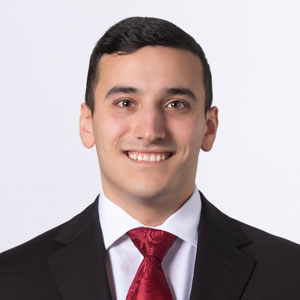Where Are They Now: An Interview with Dr. John Martucci by Dr. Alex Martinez
Presented by the American Board of Foot and Ankle Surgery (ABFAS), the Michael L. Stone, DPM, Outstanding Professional Conduct Awards recognize graduating seniors from each podiatric medical college or school who exemplify the highest standards of professionalism, deportment, and ethics in their interactions with peers, patients, professors, and staff. These exceptional students often go on to become acclaimed foot and ankle surgeons and leaders in the field.
Recently, 2024 Stone Award recipient Alex Martinez, DPM, sat down with 2018 Stone Award recipient John Martucci, DPM, FACFAS, on pursuing podiatry, the ABFAS Board Certification process, and advice for students and residents. Here’s what he had to say…
Alex Martinez (AM): How has being a Stone award winner shaped your career and what are some of the advantages it provided you?
John Martucci (JM): Receiving the Stone Award was a huge honor and affirmed my commitment to the field of podiatric medicine and surgery. It served as a springboard for my years in residency.
AM: I was made aware that you just became ABFAS Board Certified in both Foot Surgery and RRA Surgery. What is one thing that someone in my position should know about this process and the importance of being ABFAS Board Certified?
JM: Soak up everything you possibly can in residency. When you log your cases, I recommend also keeping a detailed log of the different types of surgical approaches, techniques, and hardware that are used. Keep a close eye on and follow along with your first bunion, fracture, fusion, etc., from surgery to the last post-operative visit.
When you exit residency and begin the journey of your career as the surgeon of record, you want to be able to take everything you've seen and learned to do the best for your patient from day one. There will be ups and downs, good days and bad days, but as long as you are organized and committed to your patient’s well-being, you will never let yourself or your patient down.
AM: I started residency in July at West Penn Hospital. are there any words of advice or tips you have that you wish you would’ve received prior to your residency?
JM: On the last day of your residency, you're going to experience sheer excitement and nervousness at once. You’ll be leaving the comfort zone that you've developed alongside your co-residents and attendings. While in that comfort zone, soak up everything you can. Work later than you expect. See more consults than you have to. Scrub more cases than you have the capacity for. Do more lectures than you have time for. Write and research more than ever before.
Life beyond residency is completely different. The momentum of your future will be driven by the type of physician, surgeon, researcher, educator, and writer you become in residency. A lot of what you become is self-motivated! That’s so thrilling!
AM: When choosing a career pathway, what made podiatry stick out to you, and if you could go back, would you change anything?
JM: I always knew I wanted to be in medicine. I wouldn't change anything. I sought a career in medicine to perform surgery and treat patients of all age groups. I also believe the foot and ankle is underappreciated and misunderstood as a critical part of us as bipedal beings. To be an expert in such a complex area of the body is exciting.
AM: What has been the proudest moment of your career thus far?
JM: That's an excellent question. Becoming board certified in foot and ankle surgery in the past few months is at the top of my list. Another one would be assisting my wife, Dr. Samantha Miner, as she became the first podiatric surgeon to perform an ankle replacement in our hospital system in Atlanta.
AM: When choosing which type of practice you wanted to be a part of, what were some thoughts and considerations you had when making the decision at that time?
JM: I was open to all possibilities and explored all available job opportunities that were advertised. I did not feel strongly about any particular practice environment. My only requirement was that I would be able to provide a whole variety of foot and ankle medicine and surgery for my patients and not be limited by the practice, group, or hospital.
AM: After completing a fellowship in advanced reconstructive foot and ankle surgery, how was the process of finding a job and do you believe that the fellowship gave you an advantage over other applicants?
JM: Fellowship not only exposed me to surgeries and pathologies I hadn't seen in residency, but it also helped to develop my confidence as a surgeon, professionalism as a physician, and work ethic as an individual. I felt as if I had “more years under my belt” than other applicants right out of residency.
AM: Dr. Michael Stone had a profound impact on the podiatric profession during his time with ABFAS. What are some ways in which you believe you've had an impact on the profession and your fellow colleagues?
JM: As a student, I worked hard to put podiatry in a better light amongst other health professions. I championed changes to the match week to align with the celebrations of our MD and DO colleagues. In podiatry school, as well as residency, I spoke at my undergraduate university to educate my fellow pre-medical students about podiatric medicine as a profession.
Now, I help train a fellow through the FASTR Fellowship of Atlanta and am active in the American College of Foot and Ankle Surgeons (ACFAS) as part of their volunteer committees. I help organize events at the ACFAS Annual Scientific Conference, as well as other educational opportunities throughout the year.
If I weren't connected to our profession at large in some way, then I’d feel a bit lost and on my own. Podiatry is a small profession with a huge footprint, and I love being a part of that step forward.


